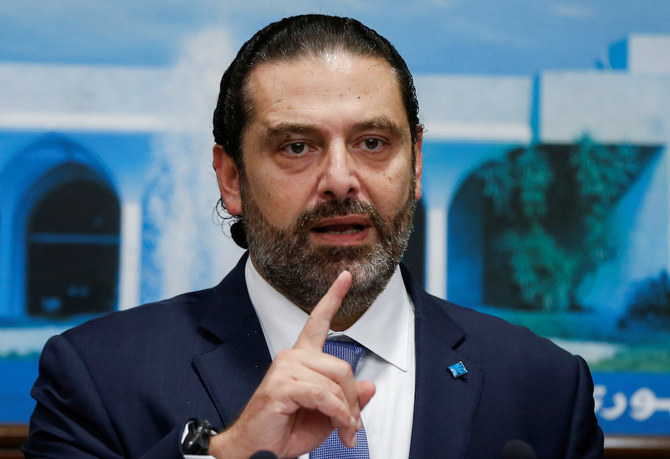BEIRUT: Foreign governments backed the Lebanese government’s reform targets on Tuesday, Prime Minister Saad Al-Hariri’s office cited the country’s UN coordinator Jan Kubis as saying.
Hariri met ambassadors including from the United States, Russia, China, the European Union and the Arab league, his office said.
They urged Lebanon to address the demands of protesters, refrain from using violence against them, and work to curb corruption, it said.
Hariri hopes the reform package will increase foreign investments and help Lebanon’s struggling economy. But the nationwide demonstrations only grew larger Monday after the reforms were announced, with protesters dismissing them as more of the same “empty promises” seen in past decades that never materialized.
Lebanon’s biggest demonstrations in 15 years have unified an often-divided public in their revolt against status-quo leaders, who have ruled for three decades and brought the economy to the brink of disaster. Rampant corruption has also hollowed out the country’s infrastructure and basic services.
In downtown Beirut, thousands of protesters were digging for a sixth day of demonstrations, insisting Hariri’s government resign. Scores of other protesters held a sit-in outside the central bank, while protests on other cities and town continued as well.
Hariri held meetings Tuesday with western and Arab ambassadors to explain the reform package.
He was also studying a possible government reshuffle, to be “determined in the coming few days,” according to the prime minister’s economic adviser, Nadim Munla.
The Cabinet approved the 2020 budget with a 0.63% deficit on Monday. The government also approved a series of reforms that would cut the budget deficit, with the central bank and the banking sector helping to reduce the deficit by about $3.4 billion next year. Lebanon has one of the highest debts in the world that stands at more than $86 billion, or more than 150% of the gross domestic product.
Munla said restoring the people’s confidence in their government “is not going to be an easy job. It’s going to be an uphill battle.”
He told reporters that the plan would include cutting debt servicing costs, privatizing no more than 40% of the telecoms sector, improving the dysfunctional power sector and cutting salaries of top officials in half.
Lebanese officials hope that plans to fix the electricity sector — which costs the state around $2 billion annually — would lead to the release of $11 billion in loans and grants made by international donors at the CEDRE conference in Paris last year.
Munla said international companies like Siemens, General Electric or Mistubishi will have a two-month window to make bids for constructing new power stations, with the winning bid announced two months later.
He said the plants — which will take years to build — should increase Lebanon’s power production by 1,000 megawatts by mid-2020. Lebanon currently produces about 2,000 megawatts, while its peak demand is nearly 3,500 megawatts. Residents rely on private generators to cover the deficit.
Walid Joumblatt, a powerful politician who has representatives in the government, criticized the reforms as “weak drugs” that aim to buy time.
From 2007 until 2010, Lebanon’s economy grew at an average of 9% annually. But it hit a major downturn in 2011, when a political crisis brought down the government and the uprising in neighboring Syria stoked unrest among Lebanese factions.
Since then, growth has averaged a mere 1.5%, according to government estimates. Munla said there will be no economic growth in 2020.
Nearly three decades after the end of the 1975-1990 civil war, Lebanon still experiences frequent cutoffs of water and electricity. With public transport networks virtually non-existent, its aging roads are clogged with traffic. Chronic problems with waste management have sparked mass protests in recent years.
(With AP and Reuters)



























